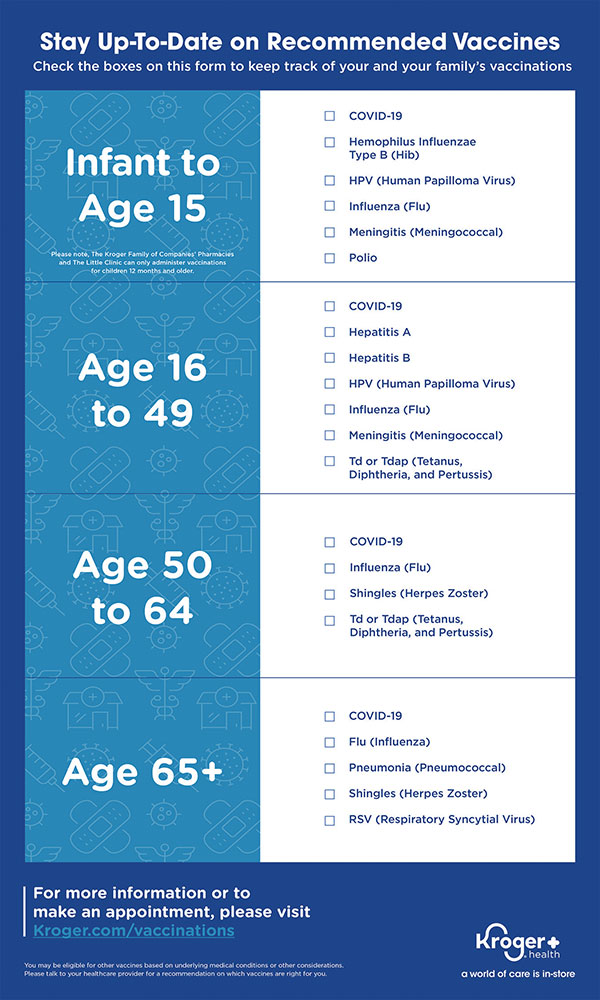health and wellness
Managing Your Family’s Year-Round Health
Last Updated on September 10, 2025 by Daily News Staff
(Family Features) Now is a good time to check in and make sure your entire family is protected from infectious diseases.
 According to the Centers for Disease Control and Prevention (CDC), vaccines help create protective antibodies that fight off infections. Timely routine vaccinations, such as MMR (measles, mumps and rubeola) and Tdap (tetanus, diphtheria and pertussis), are known to prevent around 4 million deaths annually, yet only 1 in 5 adults are up to date on their vaccines.
According to the Centers for Disease Control and Prevention (CDC), vaccines help create protective antibodies that fight off infections. Timely routine vaccinations, such as MMR (measles, mumps and rubeola) and Tdap (tetanus, diphtheria and pertussis), are known to prevent around 4 million deaths annually, yet only 1 in 5 adults are up to date on their vaccines.
Convenience, accessibility and lack of trust all play fundamental parts in why vaccination numbers are low across some demographic groups and geographic regions. Community pharmacies and clinics, such as the Kroger Family of Companies’ Pharmacies and The Little Clinic, have emerged as accessible and convenient options for people seeking needed healthcare services outside of traditional settings. These facilities offer a range of high-quality services, including medication counseling, health screenings and immunizations.
Routine preventive care, including vaccine administration, can take place at various points throughout the year and is not limited to a single season. Certain populations, such as people who are 60 years of age and older, those with chronic diseases and some minority populations, are more at risk for contracting certain infections and are encouraged to maintain updated vaccinations and boosters throughout the year. (For children younger than 5 years of age, check with your local pharmacist or clinician for vaccine guidelines.)
 The CDC recommends everyone 6 months old and older get an annual flu vaccine. Influenza, more commonly known as the flu, is a highly contagious respiratory virus that infects the nose, throat and lungs, and could lead to serious illness, hospitalization or death. Dominant flu strains are constantly shifting and protection from a single flu vaccine declines over time. To reduce the risk of getting or spreading the flu, it’s important to get a yearly flu vaccination.
The CDC recommends everyone 6 months old and older get an annual flu vaccine. Influenza, more commonly known as the flu, is a highly contagious respiratory virus that infects the nose, throat and lungs, and could lead to serious illness, hospitalization or death. Dominant flu strains are constantly shifting and protection from a single flu vaccine declines over time. To reduce the risk of getting or spreading the flu, it’s important to get a yearly flu vaccination.
Retail pharmacies and clinics hold a unique position in the local communities they serve and are deeply committed to vaccine education and outreach. In addition to providing protection against illnesses such as influenza, vaccines also offer protection against hepatitis A, hepatitis B, varicella (chicken pox), measles, RSV, pertussis (whooping cough), COVID-19 and more. By equipping people with consistent, factual information, retail pharmacies and clinics empower them to make informed decisions about their health and the health of their loved ones.
Research shows schools and colleges have the potential to cultivate a higher disease transmission rate that affects all ages, from students to staff and teachers, due to the proximity of people within buildings. When students are protected against vaccine-preventable illnesses, they experience fewer absences due to illness, allowing them to fully participate in classroom activities and maximize their learning potential.
 Ensuring children are current on their vaccines also creates opportunities for parents and caregivers to check their own preventive health statuses. The National Institutes of Health notes vaccine-preventable diseases cost the country approximately $27 billion annually in lost wages and increased healthcare costs. Missing routine immunizations could result in missed work and medical bills that could prevent people from being able to provide and care for their families.
Ensuring children are current on their vaccines also creates opportunities for parents and caregivers to check their own preventive health statuses. The National Institutes of Health notes vaccine-preventable diseases cost the country approximately $27 billion annually in lost wages and increased healthcare costs. Missing routine immunizations could result in missed work and medical bills that could prevent people from being able to provide and care for their families.
Unlike some traditional healthcare settings, retail pharmacies and clinics are easily accessible. They are often located within local communities and have extended hours that cater to busy schedules, allowing flexibility for people getting their families vaccinated. In fact, 90% of the U.S. population lives within 5 miles of a pharmacy. Options like the Kroger Family of Companies’ Pharmacies and other retail pharmacies have established vaccine clinics within their pharmacy and clinic locations, making vaccinations a seamless and convenient part of the healthcare experience they provide.
Annual Gallup Polls consistently show pharmacists and nurse practitioners are among the most trusted people in the medical field. Healthcare professionals at retail pharmacies and clinics undergo rigorous training and possess in-depth knowledge about vaccines, proper storage and handling as well as administration techniques. These professionals contribute to the confidence of their patients and the health of the community at large.
Retail providers disseminate accurate information about vaccines and address vaccine hesitancy and misinformation within their local communities. By prioritizing proactive vaccinations, retail pharmacies create an environment that supports the overall well-being of students, teachers, staff and families alike, helping communities live healthier lives.
To learn more about annual vaccination needs, visit kroger.com/vaccinations or plan a visit to a local pharmacy or clinic.
SOURCE:
Kroger Health
Discover more from Daily News
Subscribe to get the latest posts sent to your email.
health and wellness
Study Links Agent Orange Exposure to Higher Risk of Rare Melanoma
A study revealed that U.S. veterans exposed to Agent Orange are at increased risk of developing acral melanoma, a rare skin cancer located in areas not typically exposed to sunlight. With higher odds of diagnosis and poorer prognosis, early detection in veterans is vital for effective treatment and improved outcomes.

(Feature Impact) A new study found U.S. veterans exposed to Agent Orange face a higher risk of developing a rare and often overlooked form of melanoma that appears on the hands and feet, and under the nails.
Researchers reported in “JAMA Dermatology” that veterans with documented exposure to the herbicide had significantly higher odds of developing acral melanoma, a subtype of skin cancer that forms on the palms, soles and nail beds.
Unlike most melanomas, which are associated with ultraviolet radiation, acral melanoma develops in areas not typically exposed to the sun. It can resemble a bruise under a toenail or a dark patch on the bottom of a foot – locations that are easily missed and not commonly associated with skin cancer.
Because of its unusual appearance and location, acral melanoma is often diagnosed at later stages, when treatment is more difficult and survival rates are lower.
The researchers analyzed 20 years of Veterans Health Administration data, comparing more than 1,200 veterans diagnosed with acral melanoma with more than 5,000 veterans without melanoma. Veterans exposed to Agent Orange had about 30% higher odds of developing the disease.
The findings suggest Agent Orange may be an underrecognized risk factor for acral melanoma, particularly for veterans who may not view themselves as at risk for skin cancer because of limited sun exposure or darker skin tones.
“Identifying exposures that may increase risk can help inform earlier recognition and, ultimately, earlier diagnosis when treatment is most effective,” said Marc Hurlbert, chief executive officer of the Melanoma Research Alliance and a principal investigator on the study.
Senior author Dr. Rebecca I. Hartman of Brigham and Women’s Hospital said acral melanoma behaves differently from other melanomas and often responds less well to current therapies.
“Acral melanoma has a poorer prognosis than the more common cutaneous melanoma because it is often diagnosed at later stages,” Hartman said. “Identifying risk factors is critical to improving detection and outcomes.”
Agent Orange was used extensively during the Vietnam War and exposure has been linked to several cancers and chronic illnesses. These findings add to evidence the herbicide may also affect the skin in ways not reflected in traditional melanoma awareness efforts.
Acral melanoma has also been associated with sex, race and ethnicity, and prior skin lesions. Researchers said the study supports treating the disease as distinct from sun-driven melanomas that dominate public education campaigns.
For veterans, the research highlights the importance of examining less visible areas of the body, including the bottoms of the feet, between the toes and under the nails. Changes in nail color, dark streaks or unexplained spots on the palms or soles should be evaluated by a health care provider, especially for those with known Agent Orange exposure.
Researchers said the findings could help guide future screening strategies for higher-risk populations and encourage further study of why acral melanoma differs biologically from other skin cancers.
Find more information at curemelanoma.org.
Photo courtesy of Shutterstock
SOURCE:
Our Lifestyle section on STM Daily News is a hub of inspiration and practical information, offering a range of articles that touch on various aspects of daily life. From tips on family finances to guides for maintaining health and wellness, we strive to empower our readers with knowledge and resources to enhance their lifestyles. Whether you’re seeking outdoor activity ideas, fashion trends, or travel recommendations, our lifestyle section has got you covered. Visit us today at https://stmdailynews.com/category/lifestyle/ and embark on a journey of discovery and self-improvement.
Discover more from Daily News
Subscribe to get the latest posts sent to your email.
health and wellness
Progress, Not Perfection: How Healthy Habits Can Stack Up One Step at a Time
The article emphasizes that achieving better health relies on progress, not perfection. It advocates for realistic goals and highlights tools like My Life Check for personalized health assessments. Small, manageable changes in diet, exercise, sleep, and stress management can significantly impact overall well-being, making healthy habits more attainable and sustainable.

Progress, Not Perfection: How Healthy Habits Can Stack Up One Step at a Time
(Feature Impact) Despite the best of intentions, it’s common for plans to build healthier habits to fall flat. Often, the culprit isn’t a lack of motivation or discipline; rather, it’s unrealistic expectations.
Overhauling your lifestyle requires a level of commitment that isn’t always practical. Understanding your personal health needs and the challenges you need to overcome can help give you a more realistic roadmap toward better health.
Tools to Guide You
Every plan needs a starting point and there are many reputable sources that can help guide you toward a plan that addresses your personal health needs.
For example, the American Heart Association introduced My Life Check, a simple, free tool to help individuals understand their heart health and what’s driving it. Users answer simple questions about their daily habits and health factors to get a personalized Heart Health Score in minutes.
The results are private and downloadable, giving you full control of your information. The tool turns big goals into small, specific actions you can start right away. Knowing your numbers relative to your heart health (and where you are in comparison to target ranges for optimal health) can help you decide how to build a better map to get you where you want to be.
While the report is customized to each individual, no personal data is stored and answers are only used to calculate health scores and provide personalized recommendations and practical steps to improve your health, so you can use your results to focus on what matters most to you. Every small step you take, such as moving more, eating smarter, sleeping better or managing stress, can add up over time.
Finding Your Path
Once you’re armed with data and know where you stand on your heart health numbers, small steps become clearer and more manageable. That knowledge makes it easier to choose one area to focus on, such as getting more sleep, taking daily walks or adding more color to your meals.
Healthy changes don’t need to be expensive or complicated. The best habits are ones that fit real life when every action you take moves you closer to your goals.
Staying motivated and on track is also easier when you can check back in, see your progress and realize the steps you’re taking are making an impact. Checking in every few months to see how you can grow gives you the chance to celebrate your progress, learn from challenges and keep building lasting habits that feel good.
To get started with personalized tips to set your own health goals, visit heart.org/mylifecheck.
Healthy Habits for Everyday Life
Eat Smart
Choose foods that help you feel your best, one meal at a time. Add more color to your plate and focus on balance, not restriction. Simple, affordable swaps can make a real difference.
Smart Tip: Aim for an overall healthy eating pattern that includes whole foods, fruits and vegetables, lean protein, nuts, seeds and cooking in non-tropical oils such as olive and canola.
Move More
Find movement that fits your life, such as a walk, a stretch or dancing while you cook. Every bit of activity counts and it all supports your heart and mind. Move for joy, not just for results.
Smart Tip:Adults should get 150 minutes of moderate physical activity (or 75 minutes of vigorous activity) per week. Kids should aim for 60 minutes every day, including play and structured activities.
Sleep Well
Rest is a foundation of good health, not a reward. Protect your bedtime routine and give your body the recovery it deserves. Notice how good sleep makes everything else easier.
Smart Tip: Most adults need 7-9 hours of sleep each night. Children require more. Adequate sleep promotes healing, improves brain function and reduces the risk for chronic diseases.
Manage Stress
Check in with yourself regularly, both mentally and emotionally. Create simple moments to pause, breathe, laugh or step outside. Connection, kindness and calm all support a healthy heart.
Smart Tip:The first step to stress management is awareness. Step “away from yourself” for a moment. Objectively ask yourself, “Is my stress level too high?” If so, look at what might be causing that stress.
Ideas for Incremental Changes
- Dedicate 15 minutes at the beginning or end of the day to focus on self-care, whether it’s unwinding with some music, writing down your goals or reflecting on the highlights of the day.
- Aim to add an extra serving of fruits or veggies each day, such as creating a savory veggie omelet or exploring new smoothie blends that let you pack in the produce on the go.
- Give your cabinets a quick update and put the smaller plates front and center. When you use a smaller plate, you can fill it while still sticking to recommended serving sizes.
- If you’re not a fan of the gym, think about how your hobbies can play a role in your physical activity. Even gardening counts as physical activity, so get creative to get moving with an activity you truly enjoy.
- Establish a bedtime routine that allows you to ease into sleep more easily. Once you feel the impact of better-quality rest, you may find yourself more motivated to make a regular bedtime a priority.
Photos courtesy of Shutterstock
SOURCE:
Discover more from Daily News
Subscribe to get the latest posts sent to your email.
health and wellness
4 Tips to Maximize Nutritional Goals While On a GLP-1
GLP-1 medications for weight loss have gained popularity, with new research emphasizing the importance of nutrition and lifestyle. Prioritizing protein and fiber can combat common side effects like nausea and constipation, while staying hydrated and eating smaller meals enhances tolerance. Adopting these habits may improve weight loss results for GLP-1 users.

(Feature Impact) The first GLP-1 (Glucagon-Like Peptide-1) medication was approved for weight loss use more than a decade ago with new more effective versions being approved by the FDA over the past few years. As the use of these medications continues to rise, new research highlights the important role nutrition and lifestyle habits can play in supporting muscle, metabolism and long-term weight loss when using the medication.
Whether you’re new to GLP‑1s or navigating the next phase of your journey, small nutrition shifts powered by protein, fiber and hydration can help you feel strong, confident and supported.
Common side effects experienced by GLP-1 users are often digestive and include nausea, constipation, stomach pain, bloating and more. A pilot clinical trial by Atkins suggests pairing GLP‑1 use with targeted macronutrients, especially protein and fiber, may support healthier body composition and a lower-carb diet with higher protein and fiber intake is well tolerated.
Feast On Fiber
Digestive slow‑downs, including constipation, are among the most common GLP‑1 side effects. Prioritizing fiber not only helps food move comfortably through the body, it supports your gut health and steady energy. Many fibers are prebiotics, meaning they promote the growth of beneficial gut bacteria. Prioritize foods like apples, melon, berries, cruciferous vegetables and leafy greens to boost fiber intake.
Prioritize Protein
When your appetite changes, structure helps. Anchoring your day with reliable protein sources helps make nutrition easy. Prioritizing protein may help prevent lean muscle loss, and nutrient dense protein sources can help you get enough essential nutrients to support overall health. Supporting a protein- and fiber-rich diet can start with a solution like Atkins High Protein Shakes, which are packed with 30 grams of protein and 7 grams of prebiotic fiber and provide more than 20 essential vitamins and minerals.
Designed to be an ally for your nutritional goals, they’re gluten-free, low-glycemic and keto-friendly with 3 grams of net carbs and 1 gram of sugar per serving. Experts recommend making sure you’re consuming enough protein to help limit lean muscle loss when using a GLP-1 to lose weight.
Hydrate to Help Prevent Side Effects
GLP-1 users in particular are encouraged to prioritize fluids. Staying hydrated can help with both constipation and nausea, two common side effects. Drinking water helps support kidney and liver function, which are vital for weight loss and overall health. Adequate fluids help food move through your body, combat fatigue and replenish losses from potential nausea or constipation, preventing complications and improving tolerance to GLP-1s.
Eat Small, Frequent Meals
Large meals can feel uncomfortable when digestion slows. Instead, focus on smaller, more frequent eating moments that give your body a steady supply of nutrients without overwhelming your system.
For an easy, GLP‑1‑friendly option, try Atkins High Protein Bars, which are high in protein and fiber while minimizing net carbs. Available in flavors like Cookie Fusion, Chocolate Peanut Butter and Brownie Delight, they’re a satisfying way to stay fueled between meals and a simple solution when appetite cues are muted. The snacks are designed to take the guesswork out of choosing high‑protein, low‑carb options that support your goals.
Living well on a GLP‑1 is about support, confidence and clarity. Consuming adequate amounts of protein and fiber, staying hydrated and maintaining daily structure can help you feel energized and empowered every step of the way. By following nutritional guidelines and making mindful lifestyle choices, GLP-1 users can experience better outcomes on their weight loss journeys.
To explore products that prioritize protein and fiber that can be a part of anyone’s daily diet, visit Atkins.com.
Photo courtesy of Shutterstock
SOURCE:
Atkins
Our Lifestyle section on STM Daily News is a hub of inspiration and practical information, offering a range of articles that touch on various aspects of daily life. From tips on family finances to guides for maintaining health and wellness, we strive to empower our readers with knowledge and resources to enhance their lifestyles. Whether you’re seeking outdoor activity ideas, fashion trends, or travel recommendations, our lifestyle section has got you covered. Visit us today at https://stmdailynews.com/category/lifestyle/ and embark on a journey of discovery and self-improvement.
Discover more from Daily News
Subscribe to get the latest posts sent to your email.

